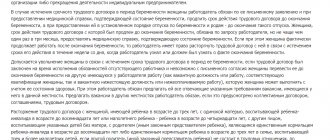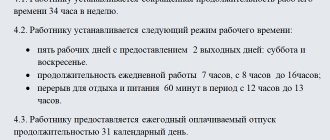According to official data on the territory of the Russian Federation, a fairly large number of family marriages break up when children are already dependent on them. In such a situation, it is determined with whom the minor remains after the dissolution of the marriage. During a divorce, the interests of the children are taken into account regarding who they want to stay with, but it should be understood that the child’s psyche may not withstand the separation of the parents, which is why joint custody is also provided, or as it is also called custody for two. In this case, it is necessary to consider in more detail what constitutes joint custody of a minor child after the parents’ divorce.
Legislative regulation
At the moment, Russian legislation provides for joint custody in the event of a divorce over minor children. In such a situation, everything is regulated by the current regulatory framework. The main provisions are enshrined in the Civil Code of the Russian Federation. There are also certain points that are prescribed in the Family Code of Russia, and in addition there are additional Federal laws and Government Decrees and Decrees of the Supreme Court of Russia. Basic information is enshrined in Articles 31 to 34 of the Civil Code of the Russian Federation. It is on the basis of these provisions that the possibility of joint guardianship outside of marriage is provided.
Important. Decisions regarding the provision of opportunities for joint custody are provided only if there is a desire on at least one side (mother or father), which subsequently makes it possible to achieve this through the court.
Joint custody of a child in divorce
Maintenance of a child after the dissolution of the marriage by both parents provides for their full participation in the upbringing of their offspring, despite the divorce. This allows you to strengthen the physical and mental health of a minor, who is often subject to suffering when their parents divorce. In practice, double custody does not imply alimony, since both trustees regularly take part in the life of their offspring and fulfill the duties of parents to the full extent. In this case, such guardianship can be by mutual consent in the following form:
- Legal guardianship.
- Physical custody.
Each individual situation involves the fulfillment of specific parental responsibilities in an appropriate way. Dual custody of children or a child during a divorce allows the trustees to independently determine the procedure and rules for raising their minor offspring within the framework of the current legislation of Russia.
Important. Not long ago, such a practice was not encountered in the Russian Federation, where it was mandatory for a child to be left with one of the trustees after a divorce, but everything changed significantly when the corresponding amendments to the legislation were adopted.
Physical
In this case, we are talking about a form of guardianship that provides for the child’s equal stay with both caregivers. In practice, the order of residence is established alternately with the mother and father, while the time of stay is set the same without prejudice to any party. Psychologists do not speak favorably about this option, since due to constant moving, psychological trauma can occur, which will significantly affect the subsequent development of the baby.
Legal
In such a situation, permanent residence with one of the guardians and temporary residence with the second parent are provided. Also, another guardian takes an active part in the life of a minor, constantly engaged in raising his offspring. It provides that all decisions regarding the development and upbringing of the offspring are made by mutual consent, which cannot be violated after joint custody. This option is more acceptable for the child’s psychological health.
Important. Joint custody is an innovation in Russian jurisprudence, which is why this point has not been fully worked out, which contributes to certain conflict situations between former spouses.

Legislative basis of guardianship and accompanying divorce
The basic law that regulates the rights and obligations of guardians is N 48-FZ “On guardianship and trusteeship” dated April 24, 2008. It describes all the nuances of the relationship between guardians and wards, their powers, and the grounds for terminating such relationships. This law has 8 chapters, from which we have selected the main information.
Guardianship refers to the arrangement of minor citizens in which they are assigned legal representatives (guardians) who perform legally significant actions on their behalf. Guardians are approved by the guardianship and trusteeship authorities based on applications from citizens and with their consent.
Natural parents, in fact, are the guardians of their child. After all, they are the ones who place the child in kindergarten and school, draw up various documents for him, and sign consent for medical intervention. In what cases will children need additional official appointment of legal representatives in the person of their mother and father? Typically, guardianship is issued if the child has serious illnesses, both physical and mental, as a result of which he needs special care. It is also possible to become guardians of other people's children. The need for this is often associated with the further adoption of the baby, because guardianship can be the first step towards this procedure. If the child’s natural parents have died, then relatives are often taken on to represent his legal interests. In such a tragic situation, it will be easier for the orphan if his relatives take care of him.
See also:
How to break an energetic connection with a man without consequences: effective practices
Guardianship is a serious responsibility, and regulatory authorities are careful to ensure that legal representatives comply with their duties. What should those parents do who have obtained joint custody of a child, but have decided to divorce? There is a possibility that, living separately, they will not be able to care for the minor as before. And supervision over the guardians is carried out constantly, so any flaws in caring for the child will be immediately detected.
Article 29 of 48-FZ of the Russian Federation lists the grounds for termination of guardianship over citizens. Divorce is not included in this list, but can serve as a serious obstacle to the implementation of their direct duties by the guardians themselves. In addition, citizens who are the legal representatives of the child receive assistance from the state. And in the event of an official separation, this help will serve as a source of additional disagreement. In this case, is further custody possible during a divorce?
The degree of participation of guardianship authorities in divorce
Since the process provides for a certain distribution of opportunities for guardianship of a minor, the guardianship authorities and the board of trustees are directly involved here, namely:
- monitor compliance with the rights and interests of the minor;
- exercise supervision over the implementation of the adopted guardianship resolution;
- take into account the interests of both parents;
- provide other provisions regarding guardianship.
All this is necessary for joint custody to be valid in practice, without prejudice to the interests of one of the parties.
Participation of guardianship authorities in the divorce of guardians
If only one of the spouses was the guardian, then after the divorce he must notify the guardianship and trusteeship authorities about changes in the composition of the family. The child will remain to live with the person for whom the contract is signed. In this case, the very fact of official separation does not indicate the unreliability of the minor’s representative, because divorce is an absolutely ordinary phenomenon. A timely appeal to the supervisory authorities will only show that the guardian is a responsible citizen.
See also:
How to tell your child about divorce without causing him psychological trauma?
When both spouses have taken custody of the children, a number of difficulties arise after the divorce. Representatives will need to share their rights and responsibilities equally. If the family received any benefits or other material assistance from the state, it will be necessary to determine to whom exactly it is now due. In such a situation, contacting the guardianship and trusteeship authorities is a necessary measure. It will not be possible to hide the fact of divorce from this authority. If the secret is revealed, the organization's employees may consider this an abuse of their rights by the guardians. After all, their divorce may go against the interests of the child. And receiving subsidies from the state for two divorced guardians can even be considered fraud.
In general, joint custody of children after a divorce can, in theory, continue, but it is optimal to grant it to one of the former spouses. Then all sensitive questions will disappear by themselves.
Documents required for joint custody of a child after divorce
In order to raise a minor together with your ex-spouse, you will need to prepare a whole list of documents. As a rule, the law requires the availability of the following official papers:
- a statement of claim to the court, since the proceedings take place through the justice authorities at the place of registration;
- A passport of a citizen of the Russian Federation is required for those who initiated joint guardianship;
- birth certificates of all minor children who are related to this process;
- confirmation of paternity establishment (if the initiator of the event is the father of a minor);
- An extract from the house register at the plaintiff’s place of residence will be required, as well as a medical certificate confirming the absence of diseases and disorders;
- You will also need to obtain a certificate of no criminal record, and in addition confirmation of official work;
- receipt of payment of the state fee for the consideration of the guardianship case by the court.
It should be understood that the claim form is provided directly to the court upon initial application, where a statement of claim is filed to resolve the current situation.
Important. If necessary, the court may request other documents, in which case the review process will be postponed to a later date.
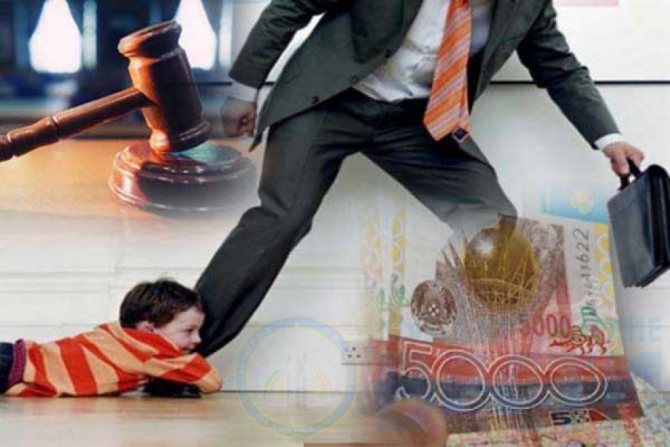
The nuances of joint custody
Most often, after a divorce, only one spouse becomes the guardian. What should the other person do if he wants to continue caring for the child? Registration of joint custody in this case is not prohibited, however, this procedure has a number of features.
- Advantages and disadvantages of joint custody. This form of placement for a minor definitely has its advantages. Firstly, it is quite convenient. Each spouse can be responsible for all legal issues related to the child. For example, not only the ex-wife, but also the husband can sign for a vaccination in the hospital. This means that each of them is capable of taking the baby to a medical facility. Secondly, the child can live with any of the guardians for as long as he wants, that is, there is no need to set a certain time at which one of them must rush from God knows where and certainly spend time with the ward. However, there are also disadvantages to joint custody. After all, it needs to be formalized, which means standing in lines, filling out a bunch of papers and waiting a long time for an answer. And control over the fulfillment of the duties of guardians will become more stringent; now there are two of them, and they are also divorced.
- Decor. To obtain joint custody of a child during a divorce, you must contact the appropriate authority and submit an application in writing. In it you must indicate your passport details, information about the minor, reasons for carrying out the procedure, as well as evidence of its necessity (serious illness of the baby, absence of parents and other reasons). The guardianship and trusteeship authorities will review the documents and issue a verdict. Whether they will arrange joint custody or not, only time will decide.
- We involve the court. If joint custody cannot be arranged, then a dispute will likely arise between the former spouses about who will be the main guardian. Such cases are considered in court, and when choosing a legal representative of a minor, judges are guided by many factors. If the child is over 10 years old, then he has the right to choose his own guardian. Young children have no say in such matters. Then, first of all, they pay attention to the applicant’s income level, since guardianship is a costly matter. The next factor: having problems with the law in the past or present. An ex-spouse who has or has had a criminal record will not be allowed to serve as guardian. Lastly, characteristics such as reviews from work, absence of serious health problems, and other signs of the reliability of the child’s future representative are considered.
See also:
Breaking is not building: the difficulties of divorce with young children under 3 years old
The decision on joint custody is quite serious, because after completing this procedure, the former spouses will have to regularly communicate with each other, which is not always pleasant. Thus, it is better to leave custody to either your ex-husband or wife to avoid unnecessary problems.
Which parent is the guardian of the adopted child after divorce?
In practice, such a procedure provides for full joint guardianship, or the appointment of a specific guardian and the subsequent full participation in the life of the child of the second participant in the process. As a rule, guardianship is assigned to the parent with whom the minor remains after the dissolution of the marriage. If a physical option is provided, then both trustees will act as guardians, but most often a legal form is provided, with children often remaining with their mothers, and fathers in turn doing everything necessary for the proper upbringing and development of their offspring.
Who do minor children stay with when their parents divorce?
In this case, we are talking about a rather complicated moment, since there is no exact answer here. If a voluntary divorce occurs, then the baby is assigned to one of the voluntary parents who is ready to take on such responsibility. In the case of divorce proceedings, it is often the mother who faces this prospect. However, the process takes into account wealth, standard of living and housing availability, as well as social status. If there are more prospects for a decent life with the father, then the court will give such a right in his favor with subsequent additions. The child’s wishes should be highlighted separately, since they are also taken into account when choosing a guardian.
Important. Since the Russian Federation is a legal state, all aspects here are regulated by current legislation, where the rules for appointing guardianship of minors are clearly established.
List of father's rights to a child after divorce
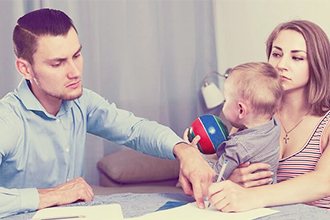
The powers of the father, which he has the right to exercise in relation to his own minor children, can be divided into 3 groups:
- In the field of communication.
- In the field of education.
- In the field of education.
Communication and meetings
The list of rights granted by law to a father who lives separately from his son or daughter is shown in the table.
| List of powers | A comment |
| A child should not be deprived of communication if his parents live in different states. | The law does not allow depriving a minor and a parent of communication if they are separated by significant distances. Moreover, nowadays there are means of communication that make it easy to overcome such problems. |
| A father must take into account the interests of his children and during meetings not harm their psyche or physical health, as well as moral development. | This means that the father cannot:
|
| A stepfather who adopts a child acquires the same rights in relation to him that the biological father previously had, including the possibility of unhindered communication with him. | This rule is enshrined in Article 137 of the Family Code. |
| The father can demand from the mother that she does not create obstacles for him to communicate with his son or daughter. | This means that the mother cannot refuse the father to meet with the minor at the time established by agreement or judicial act, except in cases where the father:
|
| The father is obliged to take into account that his child, who has reached the age of ten, may refuse to meet with him. | The opinion of a ten-year-old minor must be taken into account when solving family problems, except in cases where this directly contradicts his legitimate interests. |
| The father has the right to demand the establishment of rules for communication with the child and the drawing up of a meeting schedule in an agreement concluded with the mother. If she refuses, the father can achieve what he wants through the court. | As a rule, during a divorce, a married couple determines the rules of communication with the child and the schedule of meetings between the father and him by agreement or with the help of the court. However, it should be borne in mind that in the future the father has the right to challenge the provisions of the agreement or court decision and invite the child’s mother to conclude a new agreement on the procedure for exercising parental rights. |
Upbringing

In this area, the father, including those who have not reached the age of majority, has the following powers:
- Taking care of your son or daughter. This means that he must satisfy children's needs that do not contradict the interests of the minor, ensure his safety from the adverse effects of the environment (heat, cold) and strangers, provide comfortable living conditions, supervise him, etc.
- Ensuring the child’s interests, for example, helping with sports (buying equipment and sportswear, taking him to classes, showing an interest in success).
- Ensuring comprehensive development in the moral, physical and spiritual spheres.
- When a child is born in an informal family union from minor parents who have not reached the age of sixteen at the time of his birth, they can ask the guardianship institution to appoint a guardian for the child.
- Protection of a minor from harmful educational measures carried out in relation to him by third parties, for example, kindergarten teachers or school teachers.
- Taking into account the opinion of a son or daughter when solving educational problems.
- Seeking help from a guardianship institution or court in case of disagreements with the mother on educational issues.
- Contacting social services for psychological or pedagogical help in case of difficulties arising during the educational process.
- Concluding a new agreement with his ex-wife regarding the raising of a small child. If she refuses, the father can seek protection of his interests through the court.
Education
In the educational field, father:
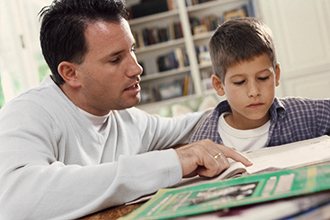
- Has the right of preferential education for his own child over third parties with the exception of the mother.
- He can, together with his mother, participate in choosing the school or kindergarten to which minor children will go.
- He can, together with the mother and taking into account the opinion of the minor, choose how the child will be educated (at school or home schooling).
- Obligated to provide the child with an education of at least 9th grade.
- Has the right to receive information about his son or daughter from employees of educational institutions, for example, information about academic performance.
Other rights
These include:
- Providing consent for the departure or relocation of a minor to a foreign country.
- Providing consent to change the surname.
How is a child’s place of residence determined during a divorce?
If a legal option for joint guardianship is envisaged, then in such a situation the specific place of residence of the child is established. Let's take a closer look at how this option is determined:
- First of all, the total area is taken into account.
- The living area of the premises is also taken into account.
- Usable housing area for each resident.
- The number of people registered in the object and their age, as well as their relationship.
- The condition of the object, which is intended as future housing.
- Development of infrastructure near the structure.
- How far from the place the child is studying.
All these points are taken into account when determining the future place of residence of a minor. Of course, here there is an analysis of the presented options from the mother’s and father’s side.
Nuances of the process in court
Any procedure for the appointment of joint custody without mutual consent implies the need for legal proceedings. Here you may encounter the following number of features:
- All legal costs are borne by the claimant.
- The parties have the right to use legal methods to protect their interests.
- It is recommended to use the services of lawyers.
- A court decision can always be appealed to a higher authority.
- At the trial, the opinion of the minor is also taken into account.
- The parties have the right to provide additional materials for the case.
All proceedings regarding joint custody take place within the framework of the civil procedural process, where the opinions of all parties are taken into account, and the regulatory framework of the Russian Federation is also taken into account.
Important. If necessary, litigation can be avoided, but in such a situation the parties must reach a mutual agreement.
